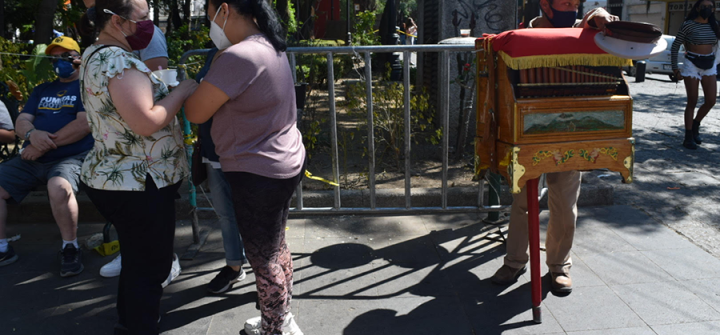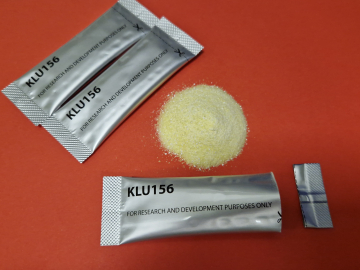In Mexico, Vaccines Arrive, but Cases Rise
In Mexico, COVID-19 vaccines are finally bringing a measure hope to a disappointing COVID-19 response (that has included disinfecting sidewalks), says Angélica López Hernández, a Mexico City-based consultant for the World Bank and the Inter-American Development Bank.
Officially, more than 200,000 people have been killed by SARS-CoV-2 but some experts say at least 3X more have died, López Hernández says. The leadership of left-leaning President Andrés Manuel López Obrador (who refuses to wear a mask) has been questioned despite government outreach to marginalized populations.
Mexicans’ greatest strength, says López Hernández, also a research associate in International Health at the Johns Hopkins Bloomberg School of Public Health, is its people. “People are very resilient,” she says. “I just wish that we had a better response, a more organized response and people were suffering less. But even among that suffering, we kind of stay together.”
López Hernández gives a big picture take of COVID-19 in Mexico in this latest installment of GHN’s COVID Countries series.
Mexico
- Confirmed Cases: 2,280,213
- Deaths: 209,338
Source: Johns Hopkins (as of April 12)
Big Picture
It’s very difficult question to put it in like a black or white box. There are a lot of grays in between. Overall, I guess people are doing the best they can. The federal government, at least, has been very conscious of the struggles of people of marginalized populations. That’s been shown in some key responses for the pandemic—social programs were targeted at very specific indigenous, or rural populations, for example.
The president acknowledged that this was a serious threat, but he still doesn’t wear a mask. And I think that’s very, very telling. He had COVID already, and he never stopped traveling and meeting people, getting close to people in a closed space. I think this has been very dangerous because it reinforces some people thinking that COVID is not a serious issue.
We recently hit the 200,000 registered deaths, but those are the official count. Some other scientists are saying deaths are up to 3 to 10 times more. Just to put it in perspective. Mexico has 120 million people, and Brazil has over 300 million. So, we’re like, way less than the population of the US. I think our responses have been similarly disorganized.
There’s not enough capacity to take care of people and also there has not been any efficient support to help them stay at home.
Mood of the People
I think that Mexicans in general are very positive. And I think that’s a good thing. I mean, across the Latin America region, we’ve known challenges throughout history. We’ve learned to make the most out of the situations.
It is like a fiction book. We have a very gregarious nature and then we start kind of fearing others. We’ve come to terms that people are vulnerable, and this has been like a very cruel and difficult year and that sometimes the only way to show our love to others was to forget this gregarious nature and sometimes isolate ourselves. I think sometimes reality overcomes fiction.
I think in general, there’s pandemic fatigue all over the world. Mexico never really closed. In the COVID response, the government prioritized the economic well-being of individuals. They decided not to shut down restaurants completely. They recommended you stay at home, but they didn’t impose any lockdown measures as in other countries. I think that is fine because there’s a lot of inequalities, and people just need to work to eat.
Worst Time
I think that’s right now. It keeps getting worse, it keeps getting worse. The spirits have lifted up a little bit because you see people are getting vaccinated. And that’s a good thing, but the death rates keeping increasing at a faster pace. The government has been focusing on showcasing the number of vaccines that they have been distributing. But if you look closely, the vaccination rates are not even that high.
Biggest Challenges
I think inequality is Mexico’s biggest challenge ever. It has driven a lot of consequences of the pandemic. We need also strong political leadership that is backed by science and has enough resources to do whatever they need.
Vaccine Hesitancy in the Country
No, no, not at all. It’s, it’s a good thing.
Schools
Schools have been closed almost a year now. They made some efforts to promote remote learning, but, of course, not everyone has access to a computer or the internet. It’s also a way that inequality shows in Mexico. Those with higher incomes have access to their own computer or iPad. So, it is very mixed.
Positive Moment
When we started thinking about getting vaccines and people started talking about them in a positive way, that gave me a lot of hope. We just can’t wait to get it.
Now everyone is wearing masks. Some are even wearing high efficiency respirators like for the medical community. People are doing what they can, what they think is best.
Odd Moments
The government has been showcasing disinfection. Things that are not like backed by science [and may be] harmful for the environment. You see people wearing like almost like space suits—like all plastic and with masks—and they’re spraying the sidewalks or outside. And that makes people feel safer.
It has happened also, for example in Colombia, I talked to with my friends there and they said, “Oh, people were disinfecting trees!”
But overall I think when you go buy groceries people keep their distance. They make it as safe as they as they can.
What’s happening in your country? To be part of GHN’s COVID Countries series, email Brian at bsimpso1 [at] jhu.edu.
Join the 50,000+ subscribers in 170+ countries who rely on Global Health NOW summaries and exclusive articles for the latest public health news. Sign up for our free weekday enewsletter, and please share the link with friends and colleagues: www.globalhealthnow.org/subscribe
Street scene in Coyoacan, Mexico City. Image courtesy of Angélica López Hernández.





